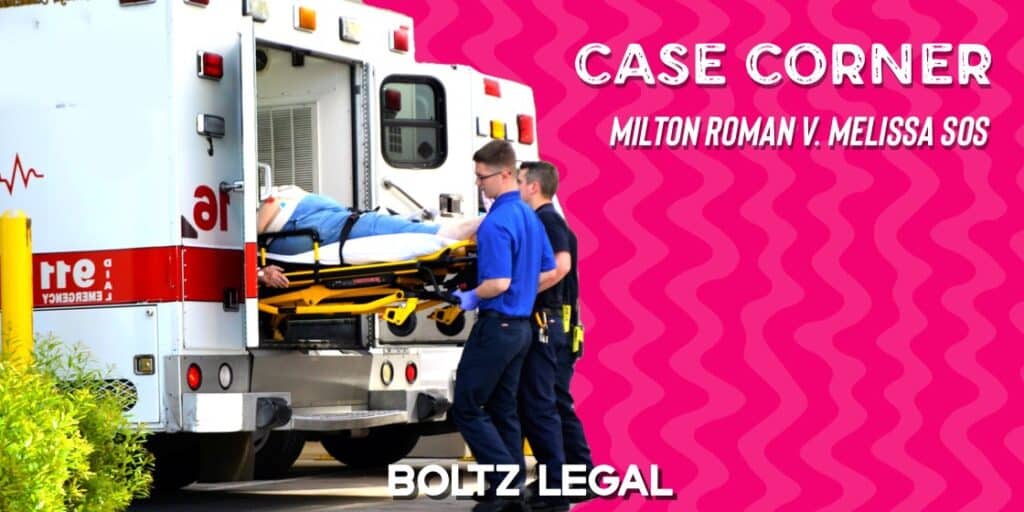A Fight Over Medical Bills
49 Fla. L. Weekly D1852a
Torts – Car Accident – Medical Bills – Was the Cost Reasonable?
2nd District Court of Appeal, September 6, 2024
Case No. 2D2022-3118
Judge: Cheryl K. Thomas
In this case, Milton Roman sued Melissa Sos after a car accident. Roman claimed the accident caused injuries to his lower back that required expensive medical treatments and surgery. He wanted to recover the money he spent on these medical bills from Sos, arguing that her actions in the accident were responsible for his injuries.
But when the case went to court, the judge decided that Roman hadn’t given enough proof to show that the amounts he was charged for his medical treatments were reasonable. This meant that Roman couldn’t recover his medical expenses. He disagreed and took the case to the Court of Appeal.
What Happened in the Accident?
On March 23, 2017, Roman was driving a work van when Sos backed out of her driveway and hit him. Roman said that the crash caused serious lower back pain, which eventually required surgery. However, he already had a history of back issues from a previous car accident in 2013, making this case more complicated.
At trial, Roman brought in two doctors to explain that the 2017 accident made his back injuries worse. Dr. Chintan Desai, a radiologist, compared MRI scans of Roman’s back from 2013 and 2017. He said the 2017 MRI showed new disc herniations that weren’t present in the 2013 scan, which he believed were caused by the 2017 crash.
Roman’s orthopedic surgeon, Dr. James Ronzo, testified that Roman’s treatments and surgery were necessary because of the 2017 accident. Roman himself testified, explaining that the pain he experienced after this crash was much worse than the pain from his previous injuries in 2013. He sought medical help just a few days after the accident and eventually needed surgery.
The Dispute Over Medical Bills
After Roman finished presenting his case, Sos’s lawyer argued that Roman hadn’t proven that the amount of his medical bills was reasonable. Even though Roman’s doctors said the treatments were necessary, they didn’t testify about whether the costs were fair.
Roman’s lawyer responded by saying that the doctors already proved the treatments were necessary and that Roman had testified that the bills were his responsibility to pay. However, the trial court agreed with Sos’s lawyer and decided that Roman hadn’t provided enough evidence to show that the amounts of his medical bills were reasonable. As a result, the judge didn’t allow the jury to consider his medical expenses at all.
The jury still heard the case on other issues and decided that Roman was 75% responsible for the accident, while Sos was 25% responsible. In the end, Roman didn’t receive any money for future medical expenses or pain and suffering because the jury found that he hadn’t suffered a permanent injury.
Roman Appeals the Decision
Roman wasn’t happy with the court’s decision about his medical bills, so he appealed. He argued that he had given enough evidence to show that the medical expenses he incurred were related to the accident and that a jury should have been allowed to decide whether the costs were reasonable.
The Court of Appeal agreed with Roman. They pointed out that when someone sues for medical expenses, they need to prove two things:
- The expenses were necessary (i.e., the treatments were needed because of the accident).
- The expenses were reasonable (i.e., the costs for the treatments were fair).
Roman had presented a summary of his medical bills without any objection from Sos’s lawyers, and his doctors had testified that the treatments were necessary because of the accident. Based on this, the appeals court decided that Roman had provided enough evidence to let a jury decide whether the amounts of his medical bills were reasonable.
The Case Goes Back to Trial
The Court of Appeal reversed the trial court’s decision on Roman’s past medical expenses and sent the case back for a new trial, but only on the issue of the medical bills. The jury will now have the chance to decide whether Roman’s medical expenses were reasonable and how much, if any, he should be awarded.
The court’s ruling shows that in personal injury cases, it’s not just enough to prove that the treatment was necessary—you also have to prove that the amount charged for the treatment is reasonable.

